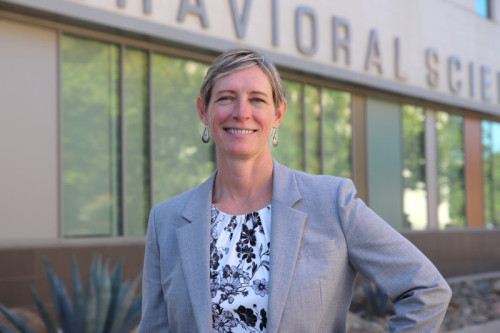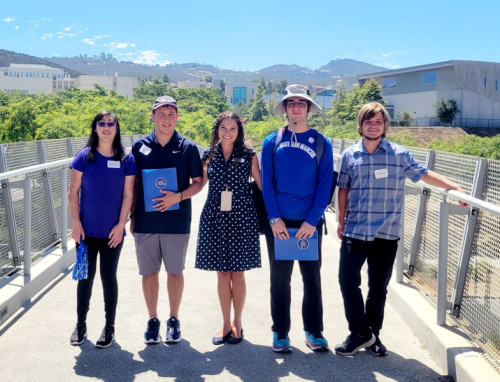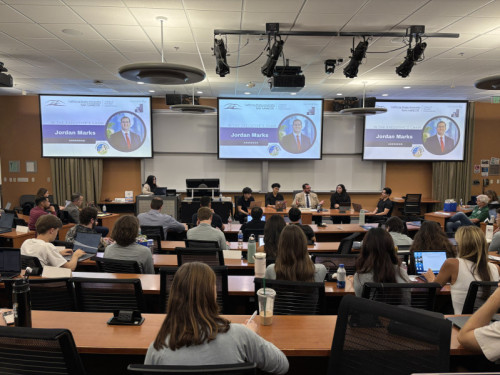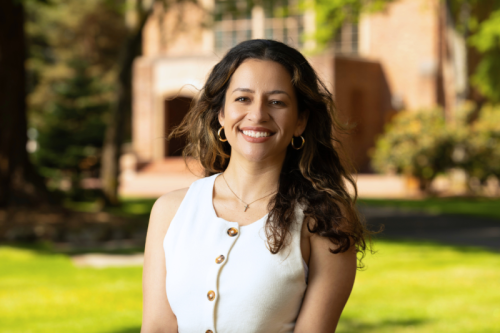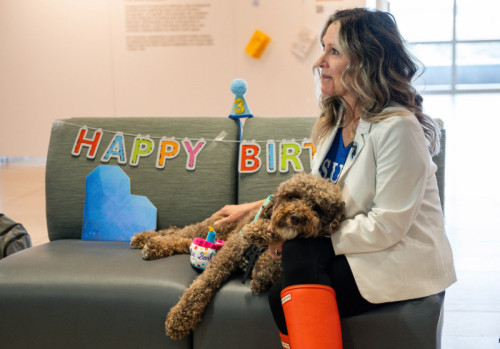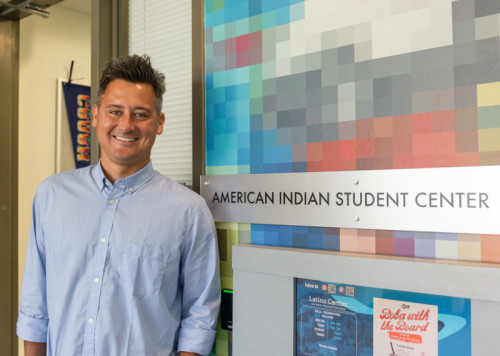New CHABSS Tenure-Track Faculty Drawn to CSUSM for Myriad Reasons
Teaching in a student population environment of around 2,500 and then moving to one with 17,000-plus is one of the many challenges that Roni Kay O’Dell, a new assistant professor of political science and global affairs, has signed up for this semester.
“I’m really impressed with high student participation in my classes,” said O’Dell, who is particularly moved by the contributions of her global governance class, which is essentially an introduction to international relations.
“I’m really excited that the students are so interested in the subject matter. We’ve also already had some really good conversations about current events that are happening in my environmental politics class, which is called Green Planet Politics.”
O’Dell is one of four newly hired tenure-track faculty in the College of Humanities, Arts, Behavioral and Social Sciences.
She is spending this week at the University of Bradford in the United Kingdom at the Human Development and Capability Association Conference, where she will present her research on how humans can agree on sustainable use and management of Earth’s resources. O’Dell is also a board member (director at large) for the organization.
O’Dell comes to CSUSM from Seton Hill University, a Catholic liberal arts university in Greensburg, Pa. There, she was program coordinator (essentially the chair) of the political science and global studies program, led the Model United Nations program and was the adviser for the Pi Sigma Alpha National Political Science Honor Society chapter.
In addition to the larger student population here, another adjustment she has enjoyed is the change in lifestyle. Along with her husband and dog, O’Dell already has basked in beach days and local hikes, including traversing Torrey Pines recently.
“There are a lot of wonderful things about where I’ve lived before, but there’s nothing like being able to go for a walk by the ocean so easily, or be on the beach or even do some of the hikes around here and enjoy the beautiful views,” said O’Dell, who grew up in Montana and earned a bachelor’s degree from the University of Washington, a master’s from the Middlebury Institute of International Studies at Monterey and a Ph.D. from the University of Denver.
O’Dell is not unlike many CSUSM students. She was the first in her family to graduate from college, beginning that journey at the community college level.
Social mobility was a crucial part of her path, so she’s excited to help guide students here by utilizing the same tools of hard work and a caring support system.
“I know that CSUSM has that amazing opportunity for students, and so many people who come here are the first people in their family who have gone to a college or are thinking about a university degree or thinking about expanding what they want to do with their lives,” she said. “That was one of the things that definitely drew me.”
O’Dell wants to support students to learn and practice how to protect the environment. Essentially, how to make sure humans can thrive while also utilizing our resources sustainably.
Putting the theoretical into practice.
“There are so many ways CSUSM focuses on sustainability, on the concern for the environment,” she said. “That’s deeply connected to my study of public policy, my study of international relations – my academic interests and research interests, but also practical interests. So that’s really exciting.”
Hyunjin Koo
Hyunjin Koo is an assistant professor in the department of psychological science. She earned a Ph.D. in social psychology from UC Irvine and worked as a postdoctoral research associate at the University of British Columbia before joining CSUSM.
As a social psychologist, Koo has two main research programs. First, her work examines how experiences and beliefs about socioeconomic mobility shape everyday thoughts and behaviors, including attitudes toward work and leisure, views of the rich and poor, perceptions of inequality, morality, and social class. Second, in an emerging line of research, she studies a novel psychological construct that she and her team have introduced – leisure guilt — which refers to the guilt people feel when taking leisure time instead of being productive. Her research explores the antecedents and consequences of leisure guilt, as well as the cultural and social factors that influence it.
What drew you to CSUSM?
Koo: I was drawn to CSUSM for its strong commitment to student success and social mobility. My main research interest is social mobility, so I was excited to find that my work aligns perfectly with the university’s mission and goals.
What are you hoping your students will take away from your classes?
Koo: I hope that through my classes, students come to see how psychology connects to many aspects of their daily lives and experiences, and that they discover the joy of engaging with psychological topics.
What is one of your professional goals you hope to accomplish while you’re here?
Koo: I want to embody the teacher–scholar model. My goal is to be both a strong researcher and a dedicated teacher who helps students achieve their own success.
What is your favorite activity during your downtime?
Koo: In my free time, I enjoy exploring new coffee shops and restaurants and finding new favorites. I’m especially excited that San Diego has so many places to discover!
Kiana Maillet
Kiana Maillet is an assistant professor in the American Indian studies department and is a member of the Lone Pine Paiute-Shoshone Tribe.
She is a double CSUSM alumna and a licensed clinical social worker with multiple certifications, and she has extensive volunteer and job experience working with youth, families and communities.
Her research interests include American Indian experiences within systems such as foster care, schools and mental health, as well as traditional teachings and experiences with language, foods, plants, places and ceremony.
What drew you to CSUSM?
Maillet: I went through the Master of Social Work and the joint doctoral programs at CSUSM and have been a lecturer here for several years in the AIS department.
What are you hoping your students will take away from your classes?
Maillet: I hope that students will learn about the beauty and complexity of Native ways of being – our side of history, science, mental health, ecology, language, the real impacts of colonization and the strength and resilience of our people.
What is one of your professional goals you hope to accomplish while you’re here?
Maillet: I hope to not only share my knowledge, but also to continue to grow and learn myself. I want to be able to make a positive impact on our students, our campus and in our communities.
What is your favorite activity during your down time?
Maillet: I enjoy hiking, gardening, playing with my grandsons and attending our Nüümü Yadoha (Paiute language) classes.
Carlos Rosas
Carlos Rosas is a new assistant professor in the psychological science department. He’s also no stranger to campus.
Rosas earned a bachelor’s degree in psychology from CSUSM and a Ph.D. in psychology with a concentration in community and prevention research from the University of Illinois Chicago. Rosas completed epidemiology-focused postdoctoral fellowships at UC San Diego and San Diego State.
For the past two years, he also has taught various classes as a lecturer at CSUSM. His research program integrates social and health psychology theories, epidemiological methods, and community-based participatory research approaches to examine the social, cultural and psychological drivers/determinants of mental and physical health (particularly in the context of chronic disease prevention and management), and to develop, implement and evaluate culturally informed and tailored, community-based interventions to promote healthy behaviors and mitigate risk factors.
His research places special emphasis on communities of color and other historically understudied populations. Rosas regularly teaches multicultural perspectives in psychology, social psychology and statistics in psychology.
What drew you to CSUSM?
Rosas: CSUSM is my alma mater. As an undergraduate, I found CSUSM to be an incredibly supportive and intellectually nurturing academic home. The encouragement and guidance I received from the psychology faculty were quite literally life-changing. I would not have pursued a doctoral degree without their unwavering support and mentorship. Hence, returning to CSUSM was the natural choice for me, and I'm really excited for the opportunity to provide my own students with the same support, motivation and inspiration that I once received from my own professors.
What are you hoping your students will take away from your classes?
Rosas: I want my students to leave my classes inspired. In particular, I hope students from low-income and historically underrepresented backgrounds see that it is possible for people like us – the first in our families to attend college, from working-class families, etc. – to move up the socioeconomic ladder and pursue careers that often seem inaccessible. I also want to instill in my students a passion for psychology and psychological research. I still remember walking out of my first social psychology class in awe of the studies we had learned about, and I hope my students leave my classes with that same sense of wonder and curiosity.
What is one of your professional goals you hope to accomplish while you’re here?
Rosas: I'm looking forward to establishing partnerships with local community organizations and clinics to collaborate on research projects that improve the health and well-being of underserved communities.
What is your favorite activity during your down time?
Rosas: I enjoy working out, primarily lifting weights, though I also like to add a cardio session from time to time.
Media Contact
Eric Breier, Interim Assistant Director of Editorial and External Affairs
ebreier@csusm.edu | Office: 760-750-7314
Latest Newsroom
- Faculty and Staff Secure Funding Across DisciplinesFor education professor Rebecca Brooks, receiving $2.5 million in grants to expand the Aspiring Scholars program is a dream come true. “It’s incredibly meaningful to give students with intellectual disabilities an inclusive college experience,” Brooks said. “My greatest hope was to obtain funding to expand our cohort size and ensure the long-term sustainability of this program. These grants make that vision a reality.” Funding at this level is highly competitive nationwide, yet faculty and staff at CSUSM like Brooks continue to stand out, securing awards that support innovative projects and create transformational experiences for students. “Our faculty and staff are pursuing some of the most sought-after grants in the nation, alongside leading institutions,” said Charles De Leone, dean of graduate studies and research. “It’s exciting to see their ideas recognized and to watch how their work enriches our students’ experiences, strengthens our campus and serves our broader community.” Examples of projects funded this academic year include: Supporting chemistry and biochemistry students: A $2 million grant from the National Science Foundation will fund student scholarships in chemistry and biochemistry as well as a Vertical Mentoring Learning Community (VMLC). Led by Robert Iafe, Afra Panahi and Aswad Allen, the program blends mentoring, research opportunities and priority enrollment for up to 30 students each year, with eight first-year students eligible for renewable $15,000 scholarships. Making exercise more accessible: Kinesiology professor Todd Astorino received a $442,590 grant from the National Institutes of Health (NIH) to explore how reduced exertion high-intensity interval training (REHIT) — two short 20-second sprints within a 10-minute workout — can improve health and make exercise more attainable for inactive adults. Expanding mobile making in local schools: Funded by the National Science Foundation, this project led by Edward Price, April Nelson and Sinem Siyahhan of the Center for Research and Engagement in STEM Education (CRESE) expands the university’s Mobile Making program. Through after-school “making” clubs across North County, undergraduate STEM ambassadors bring hands-on activities and equipment to schools, libraries and community centers. Helping students with intellectual disabilities experience college: Brooks and psychology professor Allison Jobin received $2.5 million in grants to expand Aspiring Scholars with full-time staff, a dedicated campus space and additional peer mentors. Adding water refill stations: A grant from CalRecycle will enable CSUSM to reach its goal to have a water refill station on every floor of every building. Led by Juliana Goodlaw-Morris, director of sustainability and climate justice, in partnership with Facility Development and Management, this grant will fund 10 new water refill stations and replace five older stations across campus. The project’s progress will be measured through station usage, recycling volumes and waste audits. “Each of these projects reflect the spirit of innovation and collaboration at CSUSM,” De Leone said. “They also give students meaningful opportunities to engage in hands-on research that prepares them for their future careers.” Research funding is an integral part of CSUSM’s “Blueprint for the Future” campaign, helping advance the university’s $200 million goal through both philanthropy and grants. Media Contact Eric Breier, Interim Assistant Director of Editorial and External Affairs ebreier@csusm.edu | Office: 760-750-7314
- Ohio University Fellows Join CSUSM Students for Collaborative Leadership SessionStudents from Cal State San Marcos had the chance to connect with students from Ohio University during a collaborative class session that highlighted shared experience, leadership group and cross-campus engagement. The Center for Leadership Innovation and Mentorship Building (CLIMB) hosted the students from Ohio as part of its signature In the Executive’s Chair (ITEC) series. Rajnandini “Raj” Pillai, director of CLIMB and professor of management, explained that the course brings students into direct conversation with influential leaders and creates meaningful opportunities for interaction with peers worldwide. “CLIMB always believes in collaborating with other entities on campus as well as other universities, both domestic and international, especially when it pertains to our speaker series for the community or our signature In the Executive’s Chair class,” Pillai said. The Nov. 4 visit included a joint class session featuring Jordan Marks, San Diego County Assessor, as well as an informal conversation and lunch on campus. The Ohio University students spent the afternoon exchanging insights with CSUSM students about academics, career plans and student life. CLIMB was established in 2004 by CSUSM’s College of Business Administration, with the mission of fostering the development of effective leaders at the individual, team, organizational and community levels. The center focuses on promoting innovative leadership and research through educational programs and mentoring opportunities. The ITEC series brings high-level leaders from diverse industries to speak with students about topics such as communication, decision-making, ethics and professional development. Previous cohorts have included international participants, such as master’s students from Sweden who joined ITEC via Zoom. Ohio University students also visited CLIMB over the summer. During this visit, the Raymond A. Lancaster Executive Leadership Fellow, Dan Squiller, said the experience exceeded expectations. “The feedback from our students was uniformly positive,” Squiller said. “This first engagement and eating lunch on a sun-soaked CSUSM campus was the perfect way to kick off their week of sessions in San Diego. So, thank you for orchestrating our inclusion, handling the logistics, and making us feel so welcome.” Pillai said she hopes to continue the partnership and host the leadership fellows annually, noting that opportunities like these enrich the classroom experience and strengthen CLIMB’s commitment to developing leaders through connection, conversation and community. CSUSM students also reflected on the value of the exchange. “Talking with the Ohio University students during class was a really interesting experience because it showed me how, even though we go to different schools, we share a lot of the same goals and challenges,” Lysandra Lyman said. “The main difference I noticed was in the size and culture of their school, which gave them different kinds of opportunities. But overall, it made me realize how much we all relate to each other when it comes to learning, growing and preparing for the future.” Media Contact Eric Breier, Interim Assistant Director of Editorial and External Affairs ebreier@csusm.edu | Office: 760-750-7314
- Spanish Professor Makes Feature Film DebutUp until recently, Darci Strother’s acting career consisted entirely of playing the lead role of a hippopotamus in one play. This was in third grade. So imagine her surprise when director Antonio Muñoz de Mesa approached Strother — a Spanish professor in CSUSM’s modern language studies department — about playing a significant role in his international revenge action film, “Santa Zeta.” “He wanted someone who looked fairly innocuous, kind of like a soccer mom,” said the 59-year-old Strother, who has taught at CSUSM since 1993. “He wanted someone to surprise the audience that looked like your everyday innocuous person who would actually be a villain.” The Spanish film wrapped in 2024 and recently made the film festival circuits, which included winning an Award of Excellence in the Feature Film category at the third annual Santa Barbara Indie Film Festival in September. The film made its U.S. debut at the festival. CSUSM’s Global Commitment Committee will screen it as its featured film March 9 in the USU. De Mesa has agreed to join the discussion for the screening either in person or via Zoom. “Santa Zeta” was filmed in Spain and South Korea with Strother’s scenes shot in San Marcos. Her scenes are listed as being filmed in Escondido because Escondido means “hidden” in Spanish, and it’s a play on words for the many hidden meanings within the movie. The film’s synopsis (from IMDB): A super famous travel influencer, Santa Zeta, uses her social media as a cover to travel the world hunting pedophiles, obsessed with finding her little sister’s killer. Strother played the role of Amelia, a seemingly innocent woman with a sinister dark side. “I caught the bug of embracing other new challenges,” Strother said. “I think when you’re asked to do something difficult, you’re not sure if you can do it. And then you do it, and it turns out well. That gives you the confidence of ‘Well, I wonder what’s next.’ ” Strother spoke on the panel after the screening in Santa Barbara, which was also attended by her family along with de Mesa, the production manager and other cast members. The film was the feature event Friday night for the weekend’s festivities. In addition to teaching and service, every CSUSM tenure-track faculty member must perform research and creative activity as part of their duties. For Strother, that has consisted before 2024 of writing academic articles and books about 17th century Spanish theater. What the film experience did was give her a new perspective on viewing the creative process of cinema from a new vantage point. She said she was thrilled to be on the panel for a Q&A session after the debut screening so the audience could see her true personality. “I play a very unflattering character,” she said. “I play a character who does something evil, despicable things. It was kind of exhilarating. I was able to step outside of myself and say, ‘Oh wow, I really did that.’ It’s an accomplishment I achieved in life that lives there forever.” De Mesa has 48 credits to his name on IMDB, including actor, director, producer, writer and editor. He directed “Santa Zeta” and knew immediately he wanted Strother for the role despite her lack of acting experience. They had connected many times in the past when Strother was performing research for her area of expertise. “Although Darci didn't have experience as an actress working in films, I knew her for many years and was totally sure that she could perform this role with the help of an acting coach,” said de Mesa, who was born in Madrid. “I needed an actress for the role of Amelia with a calm, intelligent energy. That's why I thought of Darci right away. Her sensibility and closeness to the acting community made it super easy to work with her in her sequence.” The request from De Mesa came at what can only be described as an inopportune time. Strother had just begun caring for her daughter, who was recovering from what Strother described as a serious surgery. In the same week, she was also asked to moderate the Global Commitment Committee’s informal conversation with students leading up to the 2024 presidential election. She was acting as GCC’s interim chair. She also was asked to sub for a class of a subject she “really didn’t know.” “All of these things that came together that made me actually feel weirdly relaxed because it felt like, OK life is throwing me all these curveballs and opportunities, and I'm not expecting of myself to do anything more than what I can do,” Strother said. “I think if I had only done the film that week I would have just been obsessing and worrying about it. Because there were so many things going on, I was taking things one step at a time. I'm going to do it and everyone in the cast and crew made me feel really really relaxed.” CHABSS faculty are often looking for new avenues to create and innovate. To go beyond the classroom to share experiences that inspire and introduce career paths beyond a straight line. Earlier this semester, Strother showed some still photographs from the film as well as pictures from the festival to her classes. She presented the images from the perspective of doing big things when you’re not expected to. Particularly when it comes to art, she wanted her students to understand it’s never too late to take risks. Even a faculty member with decades of experience in academia can become a screen actor. “It was very unexpected, but I’m kind of at that point in my life where if someone asks me to do something and I don’t think I can do it, I say, ‘Sure, why not? I’ll try it anyway,' ” Strother said. “I might succeed, I might not succeed. I have the luxury of being at a point in my career where I can try new things and take risks.” Media Contact Eric Breier, Interim Assistant Director of Editorial and External Affairs ebreier@csusm.edu | Office: 760-750-7314
- Double Alumna Pays It ForwardGrowing up in Mira Loma, a rural community in Riverside County, double alumna Amy Barrera remembers cows and few examples of social mobility. “We never heard about people going to college,” said Barrera, who earned her bachelor's in human development in 2018 and her master of public health in 2024. “If it weren’t for Upward Bound, I wouldn’t have known it was a possibility for me.” Through Upward Bound, a program that helps low-income and first-generation high school students prepare for college, Barrera received academic support, mentoring and help with applications. When Barrera arrived at Cal State San Marcos, she discovered a community that was both welcoming and unfamiliar. “I met an international student for the first time," she said. "Back home, everyone is Hispanic. It was so interesting to be in a place that celebrated diversity. The campus and the student life centers showed me that there’s a place for everyone.” After earning her bachelor’s degree, Barrera began working in health-related fields and discovered a passion for research. Returning to CSUSM for a master of public health helped her refine that passion and find belonging. “That’s when I really felt seen as a Mexican-American researcher,” she said. Receiving a scholarship from the Alumni Association was another milestone. “The money was helpful, but more importantly, being selected was super validating,” she said. Today, Barrera works at Pacific Lutheran University in Tacoma, Wash., and hopes to pursue a doctorate in public health. As an employee benefit, she was able to create a will and decided to include a $10,000 scholarship for public health students at CSUSM. “Making a will was so easy, a lot easier than I thought, and I’m extremely grateful to be in this position to give back,” she said. Supporting students like her and the public health field is at the heart of Barrera's motivation to give. When asked what she’d tell her future scholarship recipients, she doesn’t hesitate. “You received this scholarship for a reason," she said. "There are people out there who see your potential and have invested in it. Lean into that and trust your capabilities to do incredible things. Keep going!” How you can support future students in your estate plan Barrera’s story is a powerful example of how anyone, at any age, can help future students thrive. Gifts in estate plans — through wills, trusts or retirement accounts — can be changed by the donor at any time and there are many possible planned giving options to suit your needs. Gifts at all levels make a difference for students. “I want young people to know it’s easier than they think,” Barrera said. “Even with modest assets, you can still set up a planned gift. You don’t have to wait until later in life.” To learn more about planned gifts, contact P. Vien Walker, director of Planned Giving, at (760) 750-8138 or vwalker@csusm.edu or visit plannedgiving.csusm.edu. Media Contact Eric Breier, Interim Assistant Director of Editorial and External Affairs ebreier@csusm.edu | Office: 760-750-7314
- Pawsitive Influence: Frank the Facility Dog Turns 3A member of the Cal State San Marcos family is about to celebrate a special birthday. Frank the Facility Dog will be turning 3 years old on Saturday. To celebrate, Frank had a special birthday party in the third-floor lobby of Kellogg Library on Thursday. Nearly 100 students came by to wish the party animal a happy birthday just before U-hour. Frank’s party included cupcakes and candy for the guests and photos with the birthday boy. He even received a special visit from the Cougar Care Network cart, a special birthday handkerchief and an outfit from some well-wishers. Frank, a goldendoodle, is a therapy and facility dog. According to his mom, Tracy Daly, a CSUSM kinesiology lecturer and registered dietitian/nutritionist and sports dietitian, he is a beloved member of her family. She said Frank’s presence is just the present CSUSM needs. “He is bringing a lot of joy to students who are struggling or stressed,” Daly said. “And not only students, but faculty, staff and administrators.” Just this semester, Daly said, Frank has completed more than 1,500 visits, supporting mental health and building community connections. Animal-assisted therapy has shown significant reductions in both psychological and physiological stress, a recent study found. “A lot of folks on this campus are away from home, and they might be missing their dog,” Daly said. “I’ve had a lot of students tell me they recently lost their dog or they’ve had loss in their family, and they come visit Frank and he’s just this warm, fuzzy ball of love.” Vera Lee, a junior nursing major, agreed. “I met Frank during a class Tracy was doing and started following him on Instagram,” Lee said. “Frank brings me a lot of joy and helps me during the stressful times. I see Frank three times a week, and I recommend that anyone who loves dogs or animals or who has pets they’re not able to see come by and visit Frank.” Frank is fully trained and certified as both a therapy and facility dog through Pawsitive Teams and Love on a Leash. His work aligns strongly with CSUSM’s values around well-being, belonging and student success. “What we found is that Frank has a very good demeanor when it comes to therapy work,” Daly said. “He passed his canine good citizen test with flying colors.” Frank was certified as a therapy dog in just eight weeks. His journey to CSUSM took more than a year – starting with the kinesiology department; working his way through to Integrated Risk Management; the Office of Safety, Health and Sustainability; all the way up to the provost. That journey was worth it, Daly said. “I see the changes in students’ faces when they come out and hang out with him,” she said. During the fall semester, people can come by and visit Frank on Mondays from 12:15-2:15 p.m. in front of Kellogg Library, on Tuesdays from 11:45 a.m. to 12:45 p.m. at the Epstein Family Veterans Center and on Thursdays from 11:30 a.m. to 12:45 p.m. in the library's third-floor lobby. Media Contact Brian Hiro, Communications Specialist bhiro@csusm.edu | Office: 760-750-7306
- Alumnus Returns to Nest as Head of New American Indian Student CenterJoely Proudfit arrived as a professor at Cal State San Marcos in 2008 – before she became chair of an American Indian studies department that then didn’t exist, before she founded an on-campus center devoted to California Indian culture and sovereignty. That fall, Proudfit taught a course called “Native American Communities.” It was a small class, featuring only about a dozen students. One of them stood out immediately. Proudfit had known the family of Tommy Devers for years. They are both Luiseño Indians, and Tommy’s uncle is Chris Devers, the former chairman of the Pauma Band of Luiseño Indians, who has deep ties to CSUSM. But that didn’t prepare her for what she would encounter in Tommy. “I noticed his commitment and curiosity right away, but what struck me more deeply was the way he carried himself in service to his community,” Proudfit said. “His hands were always in the work. He showed up for his people with a sincerity that you cannot teach. “There is simply a light to him. My husband used to joke that Tommy should be the mayor of whatever town he happened to live in because he is just that kind of person: engaged, grounded, generous and easy to gravitate toward.” After graduating from CSUSM with a degree in communication in 2009, Devers went on to complete a master’s program in sociological practice, bolstering his connection to the university. During that time, he further immersed himself in Native studies, and even helped Proudfit move into the new California Indian Culture and Sovereignty Center (CICSC). About a year ago, then, when a job as the first leader of a planned American Indian Student Center became available, Proudfit had the ideal candidate in mind. “Tommy,” she said, “was exactly the person we needed.” And Devers was exactly the person CSUSM got. Hired as assistant director in February, the double alumnus spent his first semester observing and developing relationships with American Indian and other students while working out of an office near Proudfit in the CICSC. By late August, he had moved into his new office in the student center, which occupies a suite in the University Student Union that formerly housed the Cross-Cultural Center. This fall, he has overseen five student employees while the American Indian Student Center welcomes in an average of about 20 students per day. Greeting them as they enter is an enormous, wall-sized mural painted by American Indian studies professor Eric Tippeconnic. To make the center more inviting, Devers and his team rebranded it as “The Nest,” both a nod to the center's logo of a feather and a nickname that rolls off the tongue more easily. “This is going to become the nest where students come, they get nurtured, they grow and then they move on in their journey,” Devers said. “So it took on a more symbolic meaning as well. “There's a lot of excitement from the students, and I think they have a strong desire to make this space their own. This is the foundational year. This is when we start being mindful of how we want the center to be, the legacy we want it to have.” The Nest represents the fulfillment of a desire Proudfit has held almost from the day she first stepped foot on campus to give CSUSM’s American Indian students a place they could call their own. Out of necessity, they have congregated over the years at the CICSC on the first floor of the Social and Behavioral Sciences Building. A door opened a couple of years ago when Viridiana Diaz, CSUSM’s vice president for Student Affairs, formed an advisory committee led by lecturer John Tippeconnic, whose report affirmed the need for a dedicated center. The timing lined up perfectly with the availability of Devers, who had moved back to California after some time living out of state and was ready to return to higher education. “He was raised for this kind of work,” Proudfit said. “He is thriving because the job aligns with his spirit, his community roots and his lived commitment to our students.” Devers grew up on the Pauma reservation as the youngest of four children of a Luiseño father and Irish mother. He recalls an idyllic childhood marked not only by normal pursuits such as abundant outdoor play in the rural landscape but also by a stint as an actor. As a fifth-grader, he attended a casting call, which led a trip to acting school, the hiring of an agent and, on his seventh audition, a role in the TV show “Power Rangers.” During middle school, he even moved to Los Angeles for a year with his mom to try acting full-time before concluding that the world of Hollywood was not for him. The sense of adolescent adventure, however, didn’t come without some discomfort related to his identity. “There's definitely some pain that came up because my mom is white and my dad is Indian,” Devers said. “Being half-white on the reservation, you're very aware of your situation at a young age.” After being part of one of the first graduating classes at Valley Center High School, Devers went to Palomar College along with his brother and one of his two sisters. It was a rather aimless period for him. He explored being a photography major. He contemplated becoming an English teacher. He took a semester off to travel, and ultimately stayed at the college for almost four years. “No one who I knew could explain to me what the next steps were,” he said. Devers found direction when he transferred to CSUSM in 2007, and particularly the following year when Proudfit joined the faculty. The American Indian studies discipline hadn’t been created yet, but he took as many classes in that vein as he could. After he earned his bachelor’s degree, Proudfit helped him land a job with the U.S. Census Bureau, for which he leveraged his tribal relationships and cultural knowledge to help boost participation by Native peoples in the 2010 census. The more Devers went down the path of connecting with his heritage, the farther he wanted to go. He began working for his tribe as a youth program coordinator. He came back to CSUSM to earn a master’s and resumed his leadership in the American Indian Student Alliance. “I realized that education was changing my life in a way I never imagined,” Devers said. “The subjects I was learning about were changing the way I thought about things and approached ideas.” Devers was in his second year of the master’s program when the CICSC opened in 2011. Proudfit remembers that it was Nov. 17, the same day she returned from maternity leave. While she was holding her 3-month-old daughter, Piper, Devers and an interior designer friend of Proudfit’s decorated the center in one day on a shoestring budget. “We filled the space with photos of our students and tribal community members, and much of what they created that day still lives in the center now,” Proudfit said. “Tommy has been integral to the CICSC from day one. His labor, his vision, his spirit are all woven into the roots of that space, and I remain deeply grateful.” Fourteen years later, now married with two young children, Devers is integral to a new space for American Indian students. Following a first year in the job aimed at establishing The Nest and making students feel at home, he plans to turn his focus to career pipelines and recruitment. To that end, he’s the lead organizer for the 2026 edition of Dream the Impossible, a Native youth conference that has been held for nearly two decades and is returning to CSUSM in April. More than 500 Native middle and high school students will converge on campus for an event that will introduce them to Native professionals in various fields and tout the transformative power of higher education. Devers knows a thing or two about that. “I have such hope for what this university is becoming,” he said. “The knowledge and kinship that can be gained through American Indian studies, the CICSC, the American Indian Student Alliance and The Nest can have a massive impact in tribal communities. That's what excites me the most. We're developing students who will lead our tribal communities into a future rooted in sovereignty, accountability and cultural strength." Media Contact Brian Hiro, Communications Specialist bhiro@csusm.edu | Office: 760-750-7306



